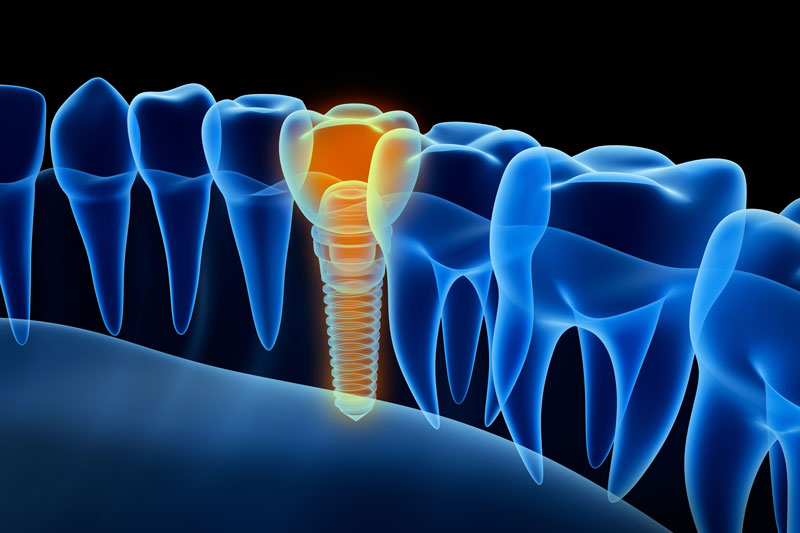Discover Dental Implants
What are Dental Implants?
Before we get into what exactly dental implants are, it is important to understand the structure of our natural teeth. Every tooth has two parts – the crown and the root. The crown is the visible part of the tooth while the root remains unseen while anchoring the tooth in your jawbone. The root does more than provide support for the crown. If the root is missing, this may lead to shrinkage of the jawbone. Dental implants can prevent this shrinkage from happening.
Dental implants are an option to replace a missing tooth. The implant is a piece of titanium that is inserted into your gums, in the spot where a tooth used to reside. Titanium is one of the few metals that does not rust and is non-magnetic. What that means is that it will not be picked up on an MRI and will not trip a metal detector. It is metal, but it is safe in every way a metal can be safe, as it will not move in your mouth due to magnetism, and it will not ever rust. More importantly, it will allow your dentist to open up your gums so that you can have a cap attached to that titanium dental implant. A cap on the implant is basically a new, artificial tooth that allows you to use that portion of your mouth for chewing.
Implants can also be used as support as part of an implant bridge. This is an alternative to partial dentures, and has advantages. First, there is no adjustment period to acclimatize the patient who, once the work is done only feels the teeth, not metal supports intruding into the mouth. Second, this slows the bone loss occasioned by missing teeth. Lastly, they don’t have be taken out all of the time!
Why are Dental Implants Needed?
There are a multitude of reasons why an individual may need dental implants; they may have a loose bridge, are tired of using dentures, or have severely broken or infected teeth. But it all comes down to one main reason: a tooth is missing or needs to be removed, and it needs a replacement. Many people wonder if a dental implant is necessary when perhaps a tooth is missing in the back of their mouth and therefore not noticeable. Most often, the answer if still yes. At Willow Springs Dentistry, our dentists take the time to evaluate each patient’s case to determine what the best solution is. If a dentist recommends a dental implant, even for a missing tooth that no one can see, it is important to do so. If you opt not to get a dental implant, it can cause a lot of additional harm to both your smile and your overall dental health.
Tooth loss often makes it difficult for individuals to speak and eat properly, but as time goes on, the consequences of tooth loss without replacement become more and more serious. With an open space from a missing tooth in your smile, teeth begin to slowly shift out of place, causing additional gaps and crooked, misaligned teeth. Your jaw can also begin to deteriorate if a missing tooth goes too long without being replaced. This happens because the alveolar bone, which is the part of the jaw that keeps the root of your teeth in place, no longer receives the stimulation it needs, and therefore begins to break down. A deteriorating jaw bone can also cause tooth loss, only greatening the problem over time. The deterioration of your jawbone can be compared to the atrophy of a muscle. When you do not use a certain muscle over time, the muscle begins to shrink, and ‘deteriorate’. The same goes with a jaw bone when it has teeth that are missing. Getting a dental implant when needed can save you an abundance of dental health issues in the future.
The Procedure
Prior to the procedure of receiving a dental implant, we have our patients use an anti-bacterial mouthwash for three weeks to prepare your mouth’s immune system and keep your implant from getting an infection. As for the actual procedure of getting a dental implant, a small titanium post is surgically implanted into the bone and allowed to set for 3-6 months. The bone grows around it forming a tight connection, which additionally slows or stops the bone loss that occurs when the root of a natural tooth is missing. Once the implant is firmly set in the mouth, there is another procedure where the dentist then works to attach the replacement tooth onto the top of the post.
There are some situations where the procedure for a dental implant may be a bit different with additional steps needed. This is dependent on the severity of the patient’s specific situation. For example, if a patient has gone too long with a missing tooth and the jaw bone has begun to deteriorate, or perhaps their jawbone is too soft or not tick enough, a bone graft may be needed in order to create a solid base for the dental implant.
The Benefits of Dental Implants
We get it, going to the dentist isn’t exactly everyone’s favorite thing, and the thought of an oral procedure to get a dental implant can be overwhelming for some. But let us reassure you, the benefits of dental implants greatly outweigh the con of having to make a trip to the dentist. Here’s a few positives to focus on:
- They have a success rate of 98% - They prevent bone loss, gum disease, and prevent premature aging - They improve your speech - They give you your confidence back with the smile you deserve
Dental Implants at Your Las Vegas Dentist
At Willow Springs Dental, we pride ourselves on being the best dentist in the Summerlin area. We have a team filled with top of the line dentists and the most helpful and friendly supporting staff you could imagine. We are experts in our field, having performed countless dental implant procedures, and we’re ready to help you too! Give us a call today or schedule a consultation to see if you’re a candidate for dental implants, and let us give you a confident smile once again!




